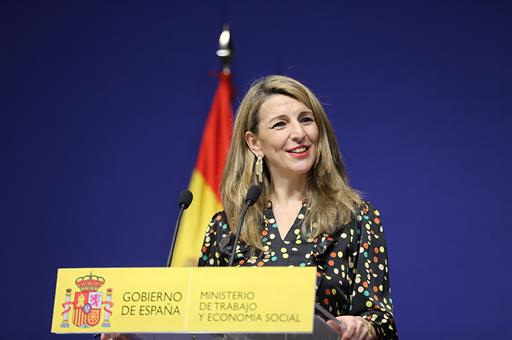Latest social agreement places Spain at head of European Union in recognition of labour rights of people who work in distribution for digital platforms
News - 2021.3.11
We will be the first European Union country to actually legislate on this matter in such an ambitious fashion", stated the minister, who recalled that this new legislation "forms part of one of the structural reforms we have presented to the European Commission, within the framework of the Recovery and Resilience Plan".
The path agreed on to establish the labour rights of workers, the so-called 'riders', whose status had already been recognised in a Supreme Court ruling back in September, is now shored up through two amendments to the current Workers' Statute, explained Minister Díaz.
"The trend in our Statute was to propitiate the exclusion or departure of workers. We are now going in the other direction, incorporating a new labour reality to the Statute, because these people were socially and legally unprotected and there was legal doctrine in this regard. We have done this through an Additional Provision - Provision 23. This recognises that they are labour workers and they have been specifically incorporated into this text".
The Minister for Work explained that "they will be labour workers with all due rights, they will contribute as such and have the social protection chain that they had not enjoyed previously. This is a piece of legislation that will change the lives of many people, essential workers, who have been on the front line during the pandemic, and those that have given their lives for all of us".
Compulsory information in algorithm formulas
Another of the key amendments introduced into the Workers Statute, which is also pioneering, is contained in Article 64. "We will incorporate an amendment into Article 64 of the Statute, which speaks about the rights to information, thanks to which it will be compulsory to report the mathematical or algorithm formula that affects the labour relationship, not just of those engaged in distribution but also in all those job positions related to digital platforms".
This Article 64, said Yolanda Díaz, "neutralises algorithm penalisations for job performance, interpreted in a biased fashion or for going on strike. This is a rule of the utmost interest for each and every worker on digital platforms".
Yolanda Díaz recalled that "you cannot choose the nature of the legal relationship of employment", as ruled on in case law to this end, she clarified in her speech, whereby the regulation announced affects labour relations developed within the framework of digital platforms and not related to the business model or the business structure, powers that do not lie with the Ministry of Work and Social Economy. "It is not platforms that we regulate, but rights", she said.
The Minister for Work explained that "these platforms have reached everywhere and form part of our daily lives; we should not be afraid of modernisation, but we must comply with and uphold employment law. There are companies that work on platforms and apply collective bargaining agreements and pay NI contributions, without applying unfair competition formulas that are of so much concern for the European Union".
90-day deadline to make operational changes
Yolanda Díaz indicated that the labour conditions of the delivery personnel are now a reality. They are now salaried workers and will enjoy full protection". The agreement reached establishes, to this end, a 90-day period for companies and workers. "This is not a deadline to recognise their labour status, which is already effective, it a deadline to adapt and deploy operational systems, and also the access to information on algorithms, due to this regulatory change".
The new legislation approved on Thursday will be put before the Council of Ministers "as soon as the preliminary internal formalities are concluded, respecting the Social Dialogue agreement, awaiting their administrative processing", concluded the Minister for Work and Social Economy.
Non official translation





